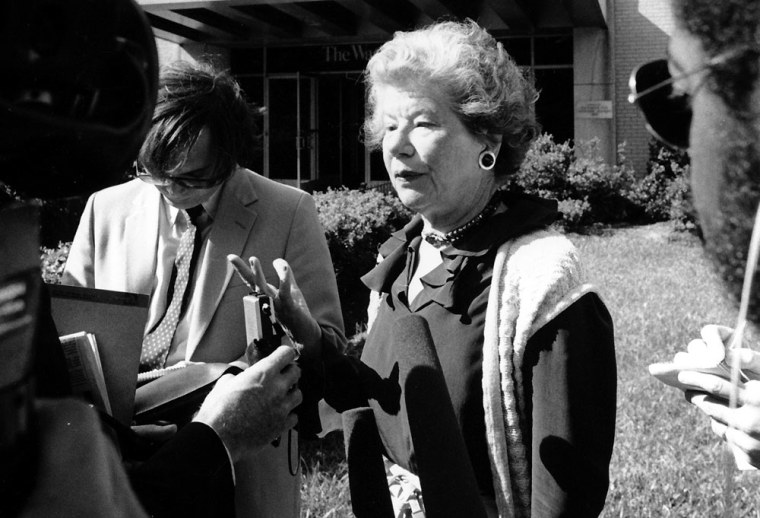Longtime Washington Post columnist Mary McGrory, a leading liberal voice whose exquisite writing and no-nonsense commentary won her a Pulitzer Prize for her work during Watergate, has died after a long illness. She was 85.
A tireless reporter well into her 80s, McGrory — who died late Wednesday at an area hospital — was a revered and influential figure in journalism in a career spanning five decades, from the Joseph McCarthy hearings during the 1950s to the 2003 Iraq war.
“The most luminous writer and clearest thinker in the business,” the Post quoted New York Times columnist Maureen Dowd as saying at a McGrory tribute several years ago.
“Mary was simply one of the best opinion columnists of her time,” said Leonard Downie Jr., the Post’s executive editor. “She wrote lyrically, and she never had difficulty expressing an opinion. But perhaps most impressive was Mary’s reporting. She seemed to know everyone in politics, and in many other fields besides. And her columns always revealed something to readers that they never would have otherwise known.”
Born Aug, 22, 1918, McGrory wrote about some of the world’s most significant events, and her eloquent prose following the assassination of President John F. Kennedy endeared her to millions of readers.
“He brought gaiety, glamour and grace to the American political scene in a measure never known before,” she wrote of Kennedy in an editorial for the now-defunct Washington Star. “That lightsome tread, that debonair touch, that shock of chestnut hair, that beguiling grin, that shattering understatement — these are what we shall remember.”
During the Watergate era, her work earned her a spot on President Nixon’s “enemies list,” alongside former Democratic presidential candidate and Sen. George McGovern, actress Jane Fonda and many others. She also won journalism’s highest prize, the Pulitzer, for commentary in 1974, the year Nixon resigned.
She did not mince words, and her clear-thinking prose was nigh-legendary. She was, former New York Times columnist Russell Baker told the Post, “a pioneering force in today’s tell-it-like-it is, show-them-no-mercy journalism.”
McGrory fell ill in March 2003. The Post said McGrory suffered a stroke-like event “that affected her ability to communicate.” She retired at the end of the year.
Her cousin, Boston Globe columnist Brian McGrory, described her in a Nov. 11, 2003, column as a “liberal lion on the left,” who once caused the first President George Bush to complain in his private journal about her, writing, “She has destroyed me over and over again.”
Born in Boston’s Roslindale neighborhood, McGrory began her career in journalism at the Boston Herald before transferring in 1947 to The Washington Star as a book reviewer.
Heralding her debut as a commentator, McGrory was tapped in 1954 to cover the Army-McCarthy hearings, which were held after the Army charged that Wisconsin Republican Sen. Joseph McCarthy was interfering with operations as he searched for communists. She stayed with the Star until it went out of business in 1981.
That same year, McGrory joined The Washington Post, where she became a syndicated columnist.
During a speech in 1985, McGrory lamented what she viewed as an absence of passion in America’s newspapers and their readers. She said she was flooded with impassioned letters during Vietnam and Watergate, but that inspired letters such as those trailed off sharply during the Reagan administration.
“I have begun to wonder what people care about, or if they care at all,” she said.
McGrory was not one to rest on her laurels. Well into her 80s she was a familiar figure in the Washington press corps, waiting with other reporters through countless “photo ops” and during frequent — and seemingly interminable — “stake outs” for members of Congress to emerge from meetings and speak to the press.
Her early success in journalism during a male-dominated business made her a pioneer, but she never identified with other women writers and did not consider herself a feminist, the Post said.
Her approach was to say, “I made it in a man’s world and you must make it, too,” former Washington Star reporter Duncan Spencer told the Post. “She felt like you get what you deserve and if you can’t work out a better deal its your failing.”
